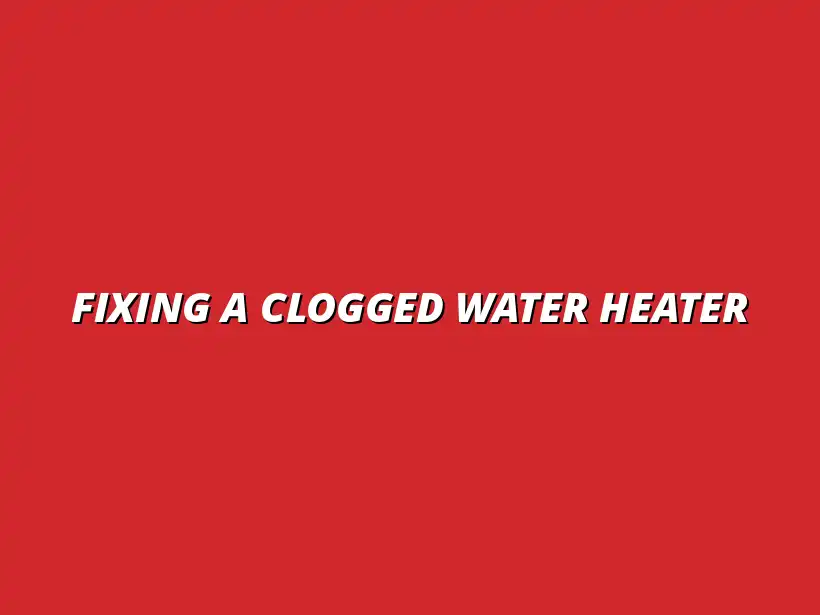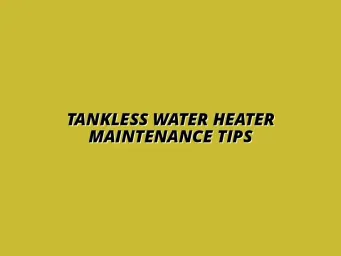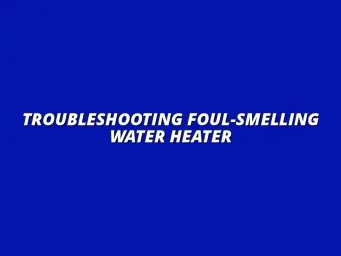
Fixing a Clogged Water Heater
Understanding Water Heater Drainage Issues
Water heaters are essential for our daily comfort, providing hot water for showers, washing dishes, and doing laundry. However, when these units face drainage problems, it can lead to a variety of issues. Understanding the common signs of poorly draining water heaters is crucial for maintaining their efficiency and ensuring a steady supply of hot water.
Ignoring these problems can result in more significant issues down the line, including costly repairs or replacements. In this section, we will explore the signs that indicate your water heater might not be draining properly and discuss the importance of proper drainage for optimal performance. If you're experiencing more serious issues, you might want to check out this guide on fixing a water heater issue.
Common Signs of a Poorly Draining Water Heater
Being aware of the symptoms of drainage issues can help you take action before the situation escalates. Here are some common signs to watch out for:
- Water pooling around the base of the unit
- Inconsistent hot water supply
- Unusual noises coming from the tank
Identifying Water Accumulation Around the Unit
One of the most noticeable signs of drainage issues is water accumulation around the water heater. This can happen due to leaks or a malfunctioning drain valve. If you notice a small puddle or constant moisture, it’s a good idea to check your water heater for any leaks.
Ignoring water accumulation can lead to not only water damage but also promote mold growth. Always investigate any signs of moisture and address them promptly to prevent further complications. For example, a clogged drain could be causing the issue. Learn how to unclog your bathroom drain easily, as similar principles apply to your water heater.
Recognizing Inconsistent Hot Water Supply
Another indication that your water heater may have drainage issues is an inconsistent hot water supply. You might experience fluctuating temperatures while showering or washing dishes. This can be frustrating and may signal that sediment is building up in the tank, affecting its ability to heat water efficiently.
If you're frequently adjusting the hot water temperature, it's time to check the system. Inconsistent performance can lead to dissatisfaction in daily routines, so addressing this issue early is essential. Regular flushing can help prevent this. Check out this guide on how to flush your water heater easily.
The Importance of Proper Drainage in Water Heaters
Maintaining proper drainage in your water heater is vital for several reasons. Not only does it enhance efficiency, but it also prevents potential risks that can arise from neglecting these issues. Let's discuss how proper drainage affects water heater performance and what risks come with ignoring drainage problems.
Understanding these critical aspects can help you take proactive measures to ensure your water heater runs smoothly and prolong its lifespan. Dealing with a noisy water heater? This guide on troubleshooting noisy water heaters might be helpful.
How Drainage Affects Water Heater Efficiency
Proper drainage directly impacts the efficiency of your water heater. When a unit has poor drainage, sediment can accumulate at the bottom of the tank, leading to several problems:
- Reduced heating efficiency
- Increased energy consumption
- Shortened lifespan of the water heater
Ensuring your water heater is draining properly can not only save you money on energy bills but also extend the life of the unit itself. Regular checks and maintenance can significantly enhance performance and reliability.
Potential Risks of Ignoring Drainage Problems
Neglecting drainage issues can lead to severe consequences. If left unchecked, these problems can result in:
- Water damage to your home
- Costly repairs or replacements
- Health risks due to mold and mildew growth
Taking drainage problems seriously is key to avoiding these risks. Keeping an eye on your water heater's performance can save you time, money, and headaches in the future!
Frequently Asked Questions about Water Heater Drainage
What Causes a Water Heater to Stop Draining?
There are several factors that can cause a water heater to stop draining properly. One common issue is a clogged drain valve, which prevents water from exiting the tank. Additionally, sediment buildup can create blockages that hinder drainage.
Another cause could be problems with the plumbing connected to the water heater. If the pipes are blocked or damaged, you might experience drainage failures. Understanding how these factors interact can help you troubleshoot your water heater effectively. Similar issues can arise with dishwashers; here's a guide on fixing a dishwasher that won't drain.
Common Issues That Lead to Drainage Failures
- Clogged Drain Valve: Prevents water from flowing out.
- Sediment Buildup: Accumulates at the bottom of the tank.
- Pipe Blockages: Affects water flow from the heater.
- Faulty Thermostat: Can lead to overheating and pressure issues.
Understanding the Role of Temperature and Pressure Relief Valves
The temperature and pressure relief valve, often referred to as the T&P valve, is crucial for maintaining safe operation in your water heater. If this valve malfunctions, it can lead to unsafe pressure levels inside the tank, ultimately preventing proper drainage. Regularly testing this valve can help ensure it functions correctly.
It’s important to note that when the T&P valve opens, it allows excess pressure and steam to escape. This process can temporarily affect drainage, so understanding how these components work together is vital for troubleshooting drainage issues.
How Often Should You Drain Your Water Heater?
Draining your water heater is an essential maintenance task that shouldn’t be overlooked. Most experts recommend draining your water heater at least once a year to prevent sediment buildup. However, your particular circumstances might require more frequent draining.
Factors like water quality and usage patterns can influence how often you should drain your unit. If you notice signs of poor drainage, it may be a good idea to drain it more often. Keeping an eye on performance and efficiency can lead to better results. If you're in the Birmingham area and need a plumber, check out this resource for plumbers in Billesley, Birmingham.
Recommended Frequency for Maintenance and Cleaning
- Once a year for standard maintenance.
- Every six months in areas with hard water.
- Whenever you notice drainage issues.
- After any major plumbing work.
Factors Influencing Draining Schedule
Several factors can influence how often you should drain your water heater. These include the hardness of your water, the amount of hot water you use, and even the type of heater you have. Hard water contains minerals that can accumulate faster, leading to more frequent maintenance needs.
In addition, if you have a larger household that frequently uses hot water, you may notice more sediment buildup. Consider these factors when creating your maintenance schedule to keep your water heater functioning optimally. Dealing with a running toilet? Here's a guide on fixing a running toilet easily.
Final Thoughts on Managing Water Heater Drainage Challenges
Recap of Key Strategies for Efficient Drainage
To keep your water heater running smoothly, it’s important to have a solid understanding of its maintenance needs. Regularly checking for signs of drainage issues and taking proactive steps can prevent bigger problems down the line. Draining your water heater once a year is a simple yet effective way to avoid complications.
Don't forget the importance of being vigilant about water quality. Keeping an eye on temperature settings and scheduling maintenance can go a long way in ensuring your water heater operates efficiently.
Importance of Regular Maintenance and Monitoring
- Prevents sediment buildup.
- Improves energy efficiency.
- Extends the lifespan of the water heater.
- Reduces repair costs over time.
Staying Proactive to Avoid Major Repair Costs
Being proactive is key when it comes to water heater maintenance. By regularly inspecting your unit and addressing minor issues early, you can save yourself from facing major repair costs. Keeping a maintenance log can help you track when tasks are due and ensure you never miss important upkeep.
Additionally, being aware of your water heater’s performance can help you catch early signs of trouble. A little attention can go a long way in maintaining a reliable and efficient water heater!
Encouraging Further Learning and Action
For homeowners looking to dive deeper into water heater maintenance, there are plenty of resources available! Local home improvement stores often offer workshops and materials specific to maintaining water heaters. Online forums and instructional videos can also provide valuable tips.
If you ever feel overwhelmed by maintenance tasks, don’t hesitate to reach out for professional help. Connecting with a qualified plumber can provide you with peace of mind as you navigate water heater care.
Resources for Homeowners on Water Heater Maintenance
- Local home improvement workshops.
- Online video tutorials.
- Maintenance guides from manufacturers.
- Homeowner forums for shared experiences and tips.
How to Connect with Professional Plumbers for Assistance
Finding a reputable plumber can make all the difference in your water heater maintenance journey. You can start by checking online reviews or asking friends for recommendations. Make sure to look for professionals who specialize in water heaters to ensure you get the best advice and service.
Also, many plumbing companies offer seasonal maintenance packages that can help keep your unit in top shape. Don’t hesitate to ask for quotes or specific services to suit your needs!




